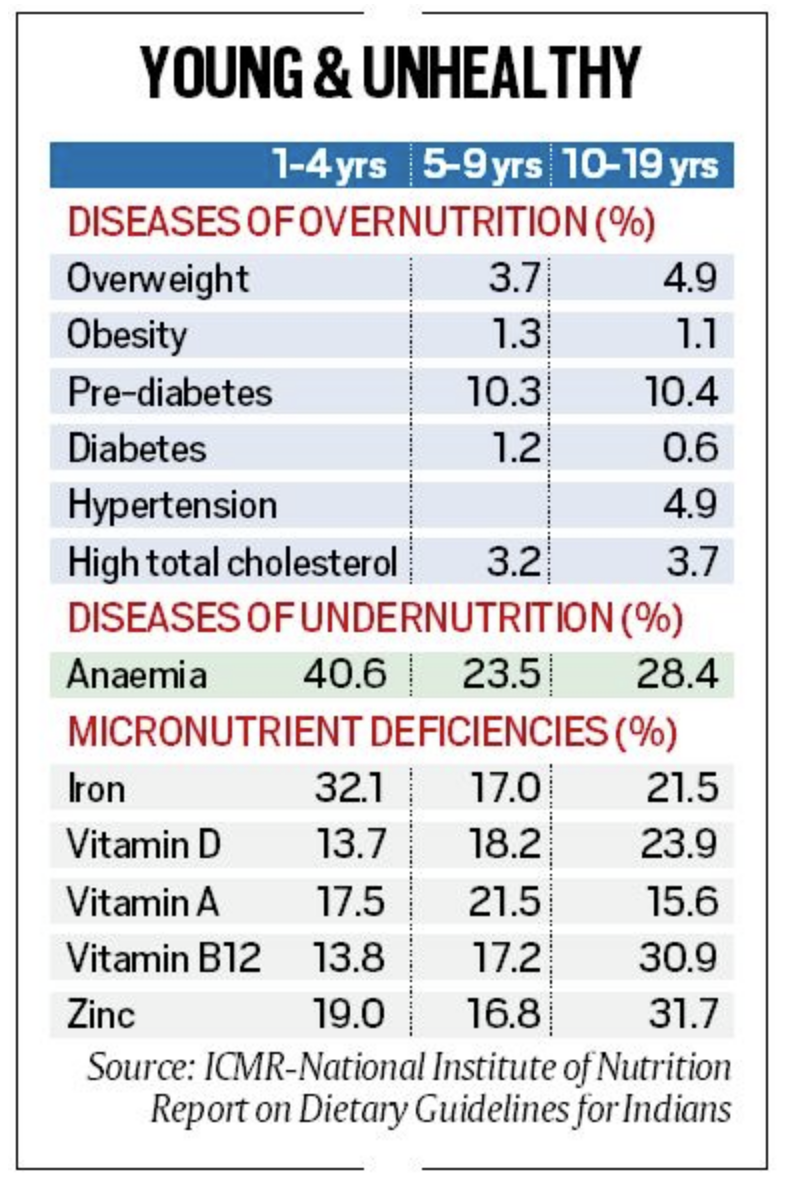News Excerpt:
The National Institute of Nutrition (NIN) has published comprehensive guidelines on the diet of vulnerable groups, including pregnant and lactating women, children and the elderly.
More about the news:
- With non-communicable diseases (NCDs) — cardiovascular disease, cancers, diabetes, etc. — rising and affecting adolescents and even children, NIN has published comprehensive guidelines on the diet of vulnerable groups.
- The guidelines take into account new scientific discoveries, evolving lifestyles, prevalent diseases, and shifting food habits.
- The recommended ideal diet charts for various groups of people take into account both micronutrient deficiencies and diseases of overnutrition.
Significance of a healthy diet:
- The guidelines say an estimated 56.4% of India’s total disease burden can be attributed to unhealthy diets.
- A healthy diet and physical activity can prevent 80% of Type 2 diabetes cases, and significantly reduce the burden of heart disease and high blood pressure.
Dual nutrition challenge:
- Incidence of micronutrient (zinc, iron, vitamins) deficiencies ranged from 13% to 30% of children between ages 1 and 19.
- The prevalence of anaemia in the country is at 40.6%, 23.5%, and 28.4% in children under age 5, ages 5-9, and 10-19 respectively.
- A study on malnutrition published in The Lancet earlier this year said undernutrition continues to be high in India, but obesity has increased significantly over the last 30 years.
- The prevalence of anaemia has risen due to deficiencies in iron and folic acid, stemming from the consumption of unhealthy, highly processed, high-fat, sugar, and salt (HFSS) foods.

General Guidelines:
- The guidelines recommend getting the required nutrients from at least eight food groups, including vegetables, leafy vegetables, roots and tubers, dairy, nuts, and oils.
- Consumption of cereals — the staple of Indian meals — should be restricted.
- They should contribute only 45% of the total energy (instead of the 50-70% now.)
- More proteins (pulses, meat, poultry, fish) should be consumed, making up 14% of the total daily energy (instead of only 6-9% now).
- Achieving adequate levels of essential polyunsaturated fatty acids (PUFA) and B12 is a challenge for vegetarians.
- The guidelines recommend the consumption of flax seeds, chia seeds, walnuts, vegetables, and greens.
- Salt and Sugar:
-
- Salt consumption should be restricted to 5g a day.
- Guidelines strongly recommend against consuming highly processed foods that are typically high in fats, salt, and sugar.
- NIN has advised Indians to restrict sugar intake to 20 to 25 grams a day.
- Oils and Fats:
- The institute also okayed air-frying as a mode of cooking for usually oil-intensive food items.
- Another key suggestion is to decrease the use of cooking oil and obtain essential fatty acids through nuts, oilseeds, and seafood.
- Guidelines advise avoiding protein supplements.
- The NIN has also introduced guidelines for interpreting packaged food labels for the first time.
Group-specific guidelines:
- Pregnant women:
- Small frequent meals for those experiencing nausea and vomiting.
- The guidelines recommend the consumption of lots of fruit and vegetables, especially those high in iron and folate content.
- Infants and children:
- For the first six months, infants should only be breastfed, and must not be given honey, glucose, or diluted milk.
- There is no need to give water, even during hot months.
- After the age of 6 months, complementary foods must be included.
- Elderly:
- The elderly should consume foods rich in proteins, calcium, micronutrients, and fibre.
- Apart from pulses and cereals — with at least one-third as whole grains — at least 200-400 ml of low-fat milk or milk products, a fist full of nuts and oilseeds, and 400-500g of vegetables and fruit should be consumed.
- Exercise is important to maintain bone density and muscle mass.
Cooking Utensils:
- NIN has termed earthen cookware as the safest utensil for cooking food and warned about non-stick pans.
- Earthen pots are eco-friendly, require less oil for food preparation, and preserve the nutrition of food.
- NIN has also issued guidelines for using metal, steel, non-stick pans and granite stones.
- Metal: Storing acidic foods like chutneys, and sambar in aluminium, iron, unlined brass or copper vessels is unsafe.
- Stainless steel: Generally considered safe, it doesn't leach.
- Non-stick pans: Risky if heat is more than 170°C. Discard it if the coating is worn out or damaged.
- Granite stone: Considered safe unless it contains Teflon coating. If so, medium-high temperature is advisable.
|
National Institute of Nutrition (NIN):
Vision:
Objectives:
|


